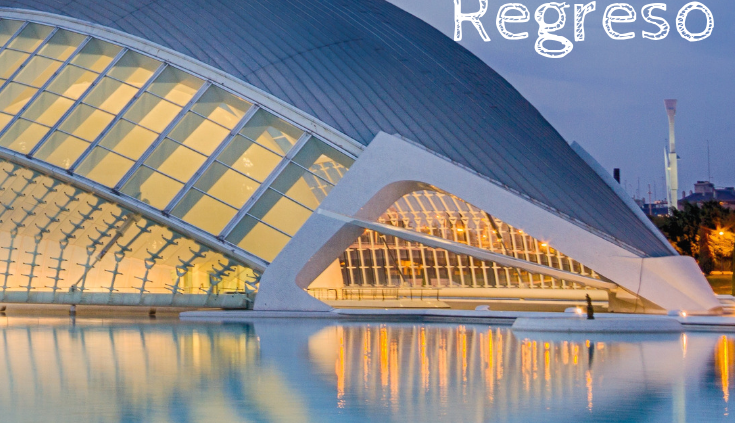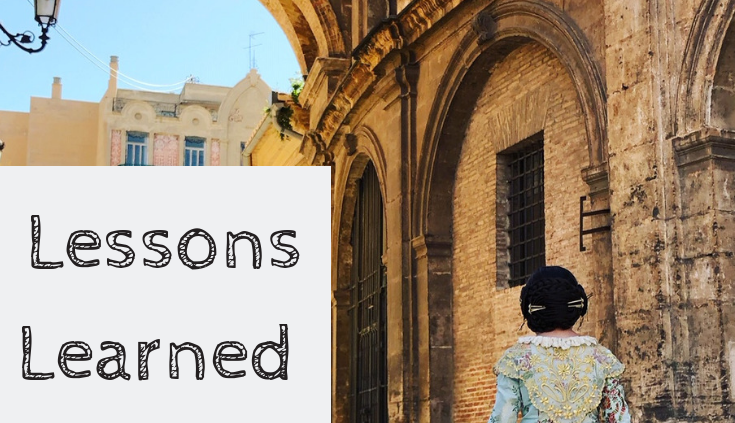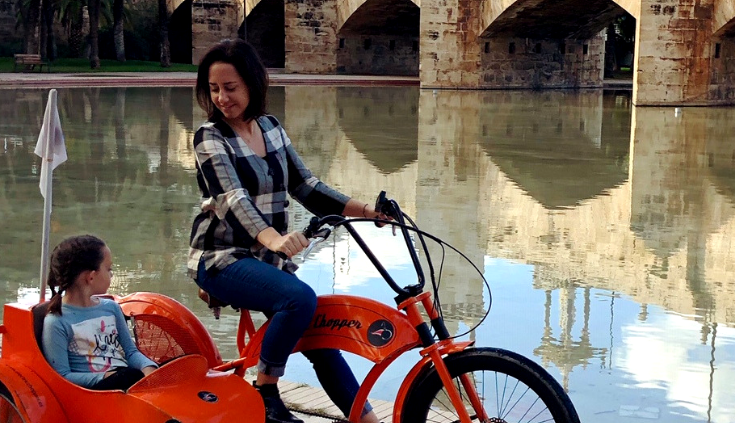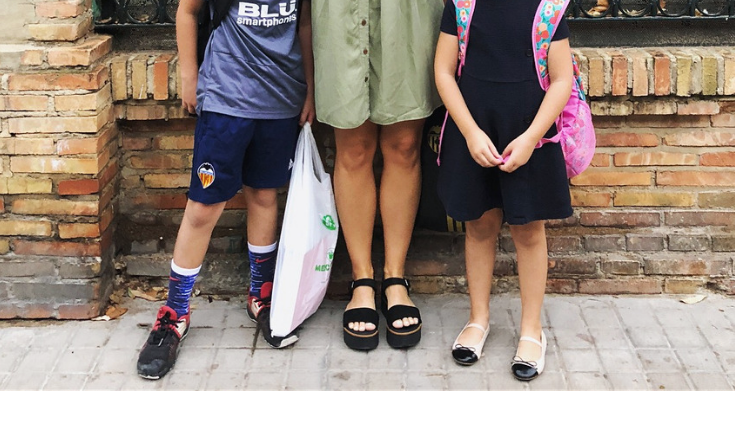Before we arrived in Europe – I thought that it was going to be Spain + our family. I knew other foreigners lived here but in a city of almost 1 million people I never thought that I would bump into them. Why didn’t I think of these other humans??? No idea. Part naivety and part self-absorbed perhaps.
If you want to make a life in a foreign country, you’d be remiss not to be prepared for the “expat” part of the journey.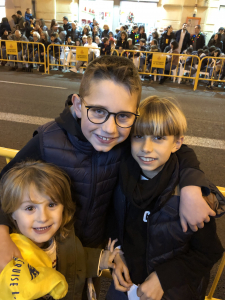
If you’re moving to get away from an “everyone knows everyone” situation – you’re in for a big surprise. We moved from a city of 50k people to a city of 900k but the expat community here is more incestuous. While this is a very wonderful and useful friend network as you need help, advice, etc. it can also be a bit challenging to navigate.
In an all-Spanish environment, English speakers are a welcome and exciting respite from the struggle to communicate. In short, it’s just easy. Furthermore, this is a way to get great information on visas, taxes, government forms, schools, etc. In a foreign world – a leg up is very much appreciated. However, there are some pitfalls and harsh truths in expat communities. In my 2 years in Spain – let me offer you some unsolicited advice:
Living abroad is a constant battle between: Do as you’ve always done or do as the locals do. This choice is not as easy or straightforward as you might think so I’m giving you a few nuggets I’ve gathered along the way.
Comfort Zones are Not Why You Moved
Likely you never said to yourself: “I want to move 5k miles across the ocean to eat at Applebees and learn English”. You will have to re-center your family and your mind with your “why” many many times over. Opportunities will present themselves on any given day: navigate a conversation in a foreign language at a dinner table with new people or have a coffee with a new expat friend from Oklahoma. The latter is easier and likely more “fun” in the short term. The former is possibly more enriching. You don’t always have to stretch yourself but you do owe it to your experience to check back in with your “why”.
Adding to the challenge: Most Spaniards have lived in their hometown all their life. This means that they don’t know what it’s like to be an outsider nor how to recognize a newcomer. You are going to have to make moves to integrate yourself and create community. One of my expat friends here has a true talent for this. She has befriended the “lettuce guy” at the market, the chefs at her local restaurants, and everyone in her path. It’s 20% because she’s outgoing and 80% because she makes an effort. She asks lots of questions, brings along thoughtful gifts as tokens of thanks, asks for phone numbers, and patronizes local businesses. She makes it look easy but it’s a fine art: equal parts courage and habit.
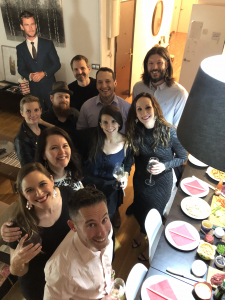
Take Your Time
Don’t worry…you will make expat friends very quickly. Before you put all of your eggs in one basket – vet your hens.
Everyone’s Experience Works for Them
Some expats do not want to meet other expats. Local’s only. That’s some Bloods and Crips type ish right there! Some people only hang with other expats. Most are a good blend of the two. There’s really no right or wrong answer – just be careful not to judge anyone’s journey. It’s easy to say before you get here: “I’m not going to hang out with a bunch of American’s – that’s not why I’m here”. Ok hot rod: don’t be too proud because unless you are fluent in the local language (regional dialects rule Spain – not Spanish) and local governments…it’s not all sangria and sunshine.
Be Patient With Locals
My cajun neighbor and I had the same experience. We deduced that the Spanish see lots of people flit in and out of their community and if you’re persistent and consistent, they will let you in. Poco a poco amigo. In year 2 we have been much more embraced as people know we care and are part of this community.
Watch Your Mouth
Follow Your Instincts
You Will Make Forever Friends
Try Not to Be a Homeland Hater
Take Language Classes

Friend Buffets
Careful with Social Media
There are lots of Expat Facebook groups. For Moms, Americans, business owners, Aussies, left-handed parakeet breeders – you name it. While there is useful information on these pages, be wary. Lots of people on these groups are no longer living in the country and some never even came – they were just traveling and wanted the inside info. When I was planning our move from the US and grasping at straws, I relied WAY too much on these groups. Now that I’ve lived here – I know that about half of those social media trolls are using old intel and are complete horse sh*t.
The Secret’s Not Out
Expats are Transient

Your experience will be what you make it. I promise that it will not be without a little comparing, a lot of language fumbles, mistakes, stories, laughs, struggles and triumphs. The expat community is a wonderful part of the living abroad and a welcome “bonus chapter” to our story of life in Spain.
All things Europe, half the cost. Valencia is the artists dream, a historian’s playground, and a place to “tranquila” like no other. Here are 10 suggestions for tours and things to do in Valencia, the fact that they’re free is just an added bonus:
- LLADRO FACTORY TOUR AND SHOWROOM
This isn’t your grandma’s pastel-colored-parakeet Lladro – there are some really neat and modern pieces at Lladro that will blow you away. A free guided tour takes about 30 to 50 minutes and starts in the morning every weekday. You’ll get the history of the famous porcelain maker, a demonstration of the careful molding process, and meet the incredible artists who hand-paint details and flowers the size of a tic-tac.

courtesy of alwaysfashion.com
Be careful bringing children under 5 as your free tour could quickly turn into 50k in breakable goods! The tour is either full because of cruise ships or completely private. Call or email to make a reservation as early as the day before using this link. If you require your tour in English – make sure to specify. The factory is in Alboraya – about 4 kilometers from the Valencia city center and is a quick taxi ride. Be careful putting “LLadro” in Google Maps as there are lots of Lladro retailers in Valencia…including a discount store if you don’t want to pay the prices at the showroom on Plaça Redona, 2, 46001 València, Spain
Mon-Fri: 10:00 – 18:00
Saturdays: 10:00 – 14:00 Sundays: Closed
2. CASA DE LAS ROCAS CORPUS CRISTI
In the heart of El Carmen, the Rocas museum is located on Calle Roteros 8 and allows visitors a chance to see Valencian “festivo” culture. The Rocas date back to 1355 and is celebrated the 8th Sunday after Easter but you can see the “Big Heads”, over 12 feet tall, and feel like you were a part of the festivities. This museum has a neat video on the 3rd floor and you can get through the entire museum in about 30 minutes.
This is only steps away from the Serranos Towers *see #5 and should be combined with an Acai bowl from the best people at Almalibre Acai Bar
Monday: Closed
Tuesday to Saturday: 10 – 14:00 and 15:00 – 19:00
Sunday: 10:00 – 14:00
3. BOMBAS GENS
This contemporary art museum, housed in a former factory from the 1930s, has an air-raid shelter (“refugio”) used during the Spanish Civil War, beautiful gardens, a 14th century wine cellar, and a 2 star-rated Michelin restaurant: Ricard Camarena
Book a free guided tour here in English of the Art, cellar, gardens, and shelter. The tour takes about an hour and takes you through the entire premise. Also note that ONCE a month the gardens are open to the public.
Make sure you make a reservation ahead of time and note that this museum is a bit north of the old city – about a 20 minutes walk.
July-September Hours:
Monday and Tuesday – Closed
Wednesday – 11:00 – 14:00 and 16:00 – 20:00
Thursday to Sunday – 11:00 to 14:00h and 17:00 to 21:00h
4. PICNIC IN TURIA PARK and WALK TO ARTS AND SCIENCES BUILDINGS
 If you only have one day in Valencia – this is how spend it. Formerly a river bed, Turia Park is a 10k/6mi park that runs through the city with unique and gorgeous bridges about every 200 yards. Go to the Central Market (see #6) and get some fresh cheese, fruit, wine, and jamon and have a picnic in the Turia. A 20 minute walk will take you from the old town/El Carmen all the way to the Arts and Sciences buildings. You won’t need a map, just follow the many tree-lined walking/biking trails and enjoy a beautiful stroll to the futuristic and iconic buildings, built by famed architect Santiago Calatrava. They are beautiful on the outside and a bit pricey on the inside. Enjoy walking around the pools and under the Umbracle for free.
If you only have one day in Valencia – this is how spend it. Formerly a river bed, Turia Park is a 10k/6mi park that runs through the city with unique and gorgeous bridges about every 200 yards. Go to the Central Market (see #6) and get some fresh cheese, fruit, wine, and jamon and have a picnic in the Turia. A 20 minute walk will take you from the old town/El Carmen all the way to the Arts and Sciences buildings. You won’t need a map, just follow the many tree-lined walking/biking trails and enjoy a beautiful stroll to the futuristic and iconic buildings, built by famed architect Santiago Calatrava. They are beautiful on the outside and a bit pricey on the inside. Enjoy walking around the pools and under the Umbracle for free.
This complex houses an IMax (Hemisferic), Aquarium (L’ Oceonagrafic), and the Arts and Sciences building with rotating exhibitions. Don’t feel like you are missing out by not buying the entrance to the building…it’s impact is best felt strolling the grounds.
5. CATHEDRALS and ANY MUSEUM ON SUNDAY!
All city-owned attractions are free on Sundays! This includes the iconic Towers: Torres Quart and Torres Serranos. Built in the 12th Century, the towers are a cool way to learn the layout of the city and see the famous Turia River park from high above the city. You only need to plan about 30 minutes at the towers in order to climb up to the top and get a great aerial view of Valencia. If you are afraid of heights, skip this. If it’s blazing hot – make sure to do this first thing in the morning. If you’re choosing between Torres Quart on the west side of old town or Torres Serranos on the north side of old town, they are really similar.
Monday do Saturday: 10:00 – 19:00
Sunday: 10:00 – 14:00 *FREE
Here’s a long list of all of the fabulous city-run museums, monuments, and parks that open their doors for free on Sundays, and are not expensive Mon-Sat – usually only 2 euro. I recommend the Fallas Museum to learn about one of the most special and grand celebrations in all of Europe!
6. CENTRAL MARKET
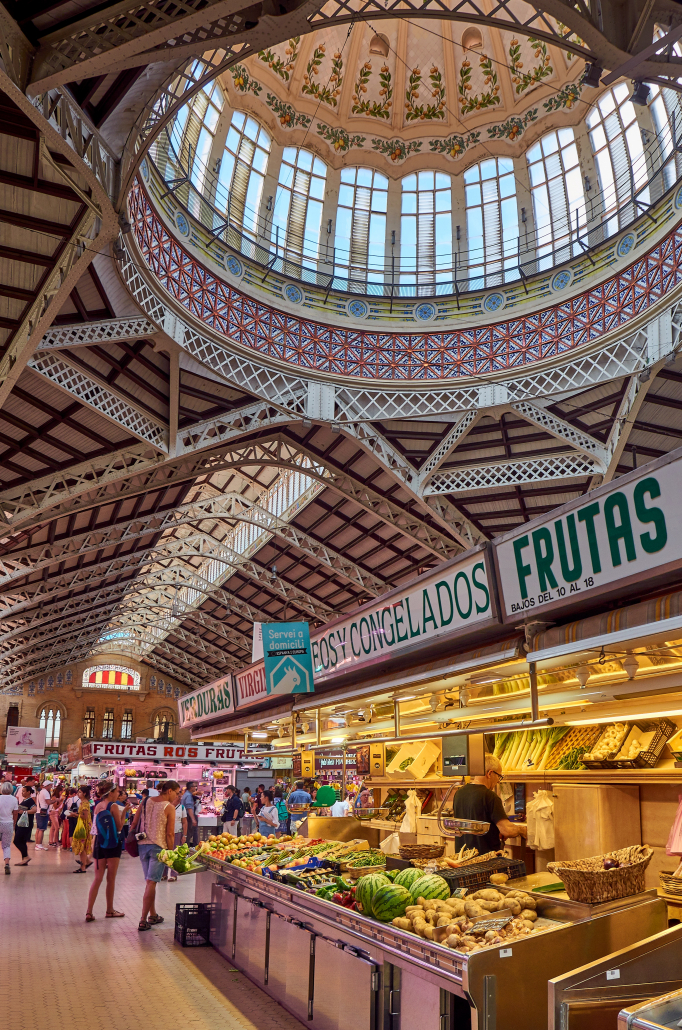 Dating back to 1839, the Mercado Central is always a great place to get some fresh-squeezed Valencian orange juice and anything else you’re in the mood for. The building itself if a stunning mosaic of colors and detailed tile work and the hustle and bustle of the market is always invigorating. If you can get up early, you’ll see the locals buying produce and restaurants curating their menus. After 10am the crowds of tourists start to roll in.
Dating back to 1839, the Mercado Central is always a great place to get some fresh-squeezed Valencian orange juice and anything else you’re in the mood for. The building itself if a stunning mosaic of colors and detailed tile work and the hustle and bustle of the market is always invigorating. If you can get up early, you’ll see the locals buying produce and restaurants curating their menus. After 10am the crowds of tourists start to roll in.
Don’t forget to visit the fish section so you can watch what really fresh eel looks like as it’s pulled from the water and decapitated. eek. Plan your visit because it closes at 3pm.
Monday – Saturday: 7:30am to 15:00
7. GUIDED WALKING TOUR
The orange vest and umbrellas mean you’ve got the right tour. These can be booked here and there are THREE different and awesome tours to take! Mornings are the “Valencia essentials” and afternoons are the “Valencia Emblematic”. The El Carmen neighborhood is famous for it’s street art and there’s a free “Street Art” tour in the afternoons too! Each tour is 2 hours and 30 minutes and you must make a reservation ahead of time online.
The licensed guides are knowledgeable and work on tips so be sure to bring some euro to show your appreciation for a job well done. These tours are rated #1 on TripAdvisor. Don’t miss!
Monday – Sunday: 10:30am and 12:00pm
Saturday 6:00pm
8. BEACHES
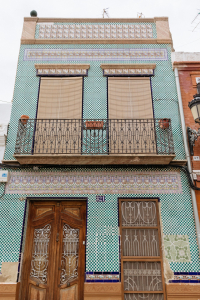 Enjoy the sun, food, and sand on the beaches of Valencia. There are a few sections of beach to choose from but if you’re looking to add a little culture to your beach day, head to the Cabanyal neighborhood. Famous for the colorful Spanish-tiled building facades, this old fisherman’s neighborhood includes a local market and is worth a stroll before you unpack your beach towel. Read more on Cabanyal here.
Enjoy the sun, food, and sand on the beaches of Valencia. There are a few sections of beach to choose from but if you’re looking to add a little culture to your beach day, head to the Cabanyal neighborhood. Famous for the colorful Spanish-tiled building facades, this old fisherman’s neighborhood includes a local market and is worth a stroll before you unpack your beach towel. Read more on Cabanyal here.
9. WANDER THE STREETS OF EL CARMEN or RUZAFA NEIGHBORHOODS
A combination of grit, street art, and European charm the neighborhood of El Carmen is a labyrinth of eye porn. Local street art will surprise you at every turn so spend at least 2 hours getting lost on the small streets of El Carmen. Stop by Plaza Tossal, Plaza del Carmen (see #10) and get a daily “menu” for under 8 euro.
Ruzafa also has a local market with its own boho flavor. Delicious cafes, great nightlife, and unique shopping make for a fun afternoon wandering the streets of this trendy neighborhood.
10. MUSEO DEL CARMEN
Formerly a convent and school to famous Valencian artists, the Museo del Carmen houses multiple rotating art exhibits. The courtyard and building itself is worth popping in and you can stroll through this museum in 20 minutes or get lost for hours. This museum is very close to the Torres Towers *number 5 and Rocas Museum *number 2. If you want to get off of the tourist path a bit, this is a great plaza that’s a bit off of the tourist loop. Check out Museo del Carmen at night too for great concerts in a 14th century courtyard. There’s no shortage of bars surrounding for a pre-party drink or 5.
Thanks for reading amigos!

If your NIE is expired and you want to travel out of the country, you’ll need an authorization to return to Spain or an “Autorización de regreso”. This has been done differently over the last years and this post is dated September 2019 specific to the Valencia Spain which is important to note as the government changes requirements often!
This process worked for my family of four and 8 other Valencian friends just as an FYI.
Here are the 6 items you’ll need to bring with you:
1) The “Autorización de regreso form” linked here. You don’t need to fill out the 3rd page. (with Anexo I and Anexo II) For “reason” I would go with a business or family related reason – remember this needs to be in Spanish:)
2) Proof of payment or TASA 790 form linked here. Pick the 2nd red button that says “aceder y arrenar e imprimir” this will auto populate your information and you just print it out and bring to any bank with cash. Each regreso costs 10.50 euro and make sure that you do not do this too far in advance as TASAs are only valid for 10 days. You’ll check box 6.3.
3) Make an appointment or “Cita Previa” by clicking this link. If you notice that there are not any appointments, check back the next day as they open more slots each day. Also, you’ll need an appointment for each person in your family. You can TRY to ask your attendant if they will process all of you…but it depends on the person and if they had their coffee that day:) We got a sweetheart and he let us do all 4 of us on only my cita! The immigration office is located at: Motilla de Palancar 23 Valencia 46019
4) Passport and a complete copy of your passport – every.single.page. They will keep the copy.
5) The form saying that you renewed your visa and a copy. This is a one sheeter with the all-important dated STICKER.
6) Your NIE and a copy front and back. They will keep it.
You’ll be approved or denied right there on the spot. You can pick up the “Autorización de regreso” in a few days!
To pick up: Each person MUST present with their passport between 11am – 1pm at Motilla de Palancar 23 Valencia 46019 which is the same office you applied. You do not need an appointment to pick up…just tell the security guard at the door and they’ll direct you to a special waiting spot for pickup.
If you have any questions, email their office at infoex.valencia@correo.gob.es – they responded to me rather quickly.
Now kick back and enjoy your travels! Your “Autorización” is valid for 90 days from the issue date. And now…a moment of silence for all of the trees murdered in the name of staying in beautiful Spain as an expat.
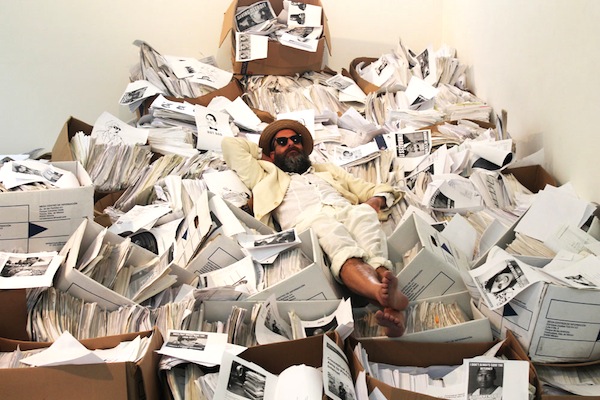
We are nearing our 1 year anniversary as expats with kids. I wrote this in the hopes that someone new to the expat life abroad scene might need a little advice from someone a year into this adventure. I enjoyed looking back on the last 11 months and while I wouldn’t change a thing, here are some things I wish I knew:
1) CHOOSE UNCOMFORTABLE
It will be tempting to gravitate towards friends that speak English so you’ll have to push yourself. In the micro decisions to go sit with all the Spanish soccer moms and try my damndest to follow their disjointed rants – I grew and learned the most. The easy thing would have been to drop my kid off and go grocery shopping or get some work done with a glass of wine at the soccer bar adjacent to the field. I truly had to psych myself into pulling up a chair, shoving myself physically into the circle of parents, and trying to express myself a foreign language. It’s still not easy but it gets better every week as they realize I care and get to know me.
This goes for school drop off and pick up when I was hot and just wanted to get a start on our 20 min sweaty walk home, doling out snacks and a listening ear from an emotional school day. Instead, I tried to mingle and chat with parents and scruff some cute little kid heads. I wanted to get get home and get my bra off but I also wanted to be a part of a community. Those efforts have been embarrassing and tiring but again – worth it.
2) TRAVEL SMART
Looking back on this first year I wish I would have relaxed a bit on the amount of trips we took. I did it American style: Get outta dodge at every school break! I didn’t take into account that just being here IS travel in year #1. There is so much to see and learn, local holidays to experience, and playdates and coveted birthday party invites that shouldn’t be missed in a new community. We took 6 trips this year and I would suggest shaving that down to 2 or 3. You’ve got time. It also is a lot of work to discover your new country, make new friends, set up routines, etc and with kids a trip throws that rhythm off.

3) VISA RENEWAL TIMING
With your NIE residency renewal you can apply 60 days prior to your expiration date – try and renew as soon as you can to get the ball rolling. Be mindful of travel after your NIE has expired if you are planning to go out of the country. You can still travel but you’ll have to get an “autorización de regreso”. Also, if you are leaving while your visa is being processed you’ll want to be mindful of the timing on any documents that they might need from you – if you’re gone for over 10 days, you might be sweating that instead of enjoying your vacay. I planned lots of summer travel and I wish I would have considered the expiration date of my NIE and the visa renewal process. Email me if you have questions.
4) YOU ARE STILL YOU
I love the Spanish people and culture and I want to fit in here and immerse myself in the culture. That said, I am also American. We have realized that we don’t have to do everything that Spaniards do just because we think we should. The Spanish eat lunch at 2 or 3pm and dinner at 10pm – this just doesn’t work for us. Our kids need sleep to function and my marriage needs me fed to function. We pick the kids up at 4:00 from school so a 3:00 lunch doesn’t work. At the end of the day we’re still Americans in Spain. I am proud of both parts of that statement and we’re doing what works for our family.
5) THE PAPERWORK IS NEVER DONE
I thought that after my initial visa application to get here I was over the paperwork hump. In fact, it was just beginning. For a country that is all about “tranquila” – I was stressed out too much this past year about the visa renewal, soccer “ficha” (a lengthy registration that is required to play soccer in a league), and authorizations to travel (see #3).
My advice – find a good local Tabacc store to make your copies and print documents enjoy their company, because you’ll be there a lot:) A printer is a smart investment but wasn’t for me as I had already befriended two ladies down the street who have put my whole world on that copier glass. We’re in too deep.
Moreover, stay comfortable in the paperwork groove. It will get done, you will get all the documents rounded up. Don’t wait until the last minute and always bring every paper you own to every meeting because you never know who will need what. I’ve come to accept that paperwork and hoops are a part of expat life and like any other challenge in this life abroad – it’s worth it.
6) EVERYTHING CHANGES IN SPANISH BUREAUCRACY
This post will be outdated in 6 days or 10 months as Spanish document requirements are a moving target. Be careful with advice from Expat online groups and friends because processes are always changing. Email consulates, email the immigration office and ask questions of government officials or of someone with very recent first-hand experiences.
infoex.valencia@correo.gob.es is the email address for the immigration office.
7) WORKFLOW TAKES TIME
I thought that we would be able to just continue to “work from home” like we did in the states. We run a digital marketing agency and had a hard time adjusting to the time change for our first few months. We would wake up and “beat” employees and clients to tasks but we had to take calls during their business hours – aka Spanish wine and dinner time. This posed a problem as were were almost working “double days” at first – working all day and then taking calls at 8 and 9pm. Also, with our small space we were not allowing our kids to be kids. They had to stay quiet and still while we were on a call or one of us had to leave. It took time to set up a rhythm but I would say to anyone working on a different time zone in a new place – you need to account for some adjustment time and a whole lot of teamwork 🙂
8) SAY NO
I realize that I am contradicting #2 but I am proud of myself for not saying yes to every new friendship, coffee, and playdate. This first year was about exploring our city, settling in to new digs, and you just can’t do it all. You aren’t desperate for friends – you’re in the quiet search for good people. There’s a big difference. I’m glad I vetted my friendships and followed my gut on saying no when I wasn’t feeling it.
9) TAKE SPANISH LESSONS
I was a 10 year Spanish teacher with a Mexican language background. I quickly learned that Spain is a different beast. Taking 90 minutes a week to go to a nearby language school for private lessons has made a huge improvement in my understanding of idioms, slang, cultural norms, and has given me a more confident command of the language. Unless you are a beginner, I would shy away from group lessons with more than 2 people. That’s another blog entirely;)
10) YOU WILL HAVE VISITORS!
Because of all the paperwork, community building, getting aquatinted, and travel – squeezing in guided tours of your city is not always easy. We had over 20 visitors that came to see us and Valencia this year!! I am SO grateful they came all this way. However, I did not factor the emailing recommendations, making reservations, tour guide assisting, stopping of my “normal life”, etc that would come with those visitors.
Try and spread out visitors a bit and make sure to let them do some exploring on their own so you don’t burn out as a guide. Communicate with your loved ones ahead of time that you are not on vacation, you are living your regular life and they will understand completely. I strategically didn’t go to places or take a tour knowing that I would do that with the next visitor – that made it fun for all of us experiencing it together.
Don’t encourage people to visit you that will not enjoy themselves in a foreign country…their distaste for something you love will likely ruin your relationship. This didn’t happen to me but I think it’s worth mentioning.
10) YOUR KIDS WILL BLOW YOUR MIND
Looking back a year ago I was so nervous about them (ages 7 and 9) not being able to speak any Spanish before we came. I smile at this now. Kids are incredibly fast learners. They picked up the language in public school here so fast and developed a lot of grit as they navigated new cultures and situations. My favorite part of this move is undoubtedly watching my kids grow, learn resilience, and understand what it feels like to be different. They will carry this empathy with them for the rest of their lives.
Don’t impart your adult fear on the peanuts…they are more malleable than you can imagine.
If you are newly abroad I hope you make your own top 10 list and jot it down to reflect on later. If you are thinking about jumping the pond – you can do it! If you are one of the 20 people that visited us – thank you for spending your money, vacation, and time with us! We missed you and hope you feel in love with our city. We cherished making memories with you, vale:)
If you are one my new “Spanish friends” or “Spanish/American friends” – you are a true treasure to me and I thank you BEYOND words for helping us, including us, going out of your way, answering questions, embracing my kids, and loving us this first year. Brindis al año que viene … más aventuras, la risa, los nenes, y Bobal…AMUNT Valencia!
Thanks for taking the time to read friends…
xKate
“You’re so lucky”. Lots of people tell us that. The truth is, luck has played no part in our move abroad. In fact, I find myself a little frustrated. Luck?! You think the Spanish Sangria fairy visited me in rural Tennessee and flew us over the Atlantic?
On the contrary, we worked really hard and planned a lot to make this move a possibility. We took risks, prepared our employees and clients, broke tough news to families and friends, applied for visas, scouted out a city, poured over budgets, sent a million emails, read books, scoured blogs, sold our stuff and our home. It took us almost 18 months of planning and preparation. That wasn’t luck. That was teamwork.
Luck is defined as “success or failure brought by chance rather than through one’s own actions” and everything we did to get our family here was a direct result of our actions.
We still work to sustain our lives here. We both literally work 9-5 at our home office or coffee shops and sometimes, because of the time change, we alternate working “second shift” taking calls from 5-10pm here (10am – 3pm CST) as most of our clients are stateside while the other person takes after school kid activities and dinner duty. We run a digital marketing/web design agency called Data Driven Design. We have 8 employees and their families that depend on us and our small team is like family. If you’re familiar with small business, you know the grind.
To be clear, I’m not complaining. I’m just telling you that this is the picture we don’t post: Laptops open, faces aglow, kids asleep, as we check in on the business and our work family. We wouldn’t have it any other way. The long nights mean we can afford tomorrow’s adventure:)
Some days here are a real struggle though. To fit in, to learn the language, to do homework with foreign math formulas, to navigate health and public systems, to eat dinner between the hours of 9 and midnight, to encourage the kids to try new things when a new country has already pushed us to the edge of our comfort zones. Simple things like finding bed sheets take way too long and I’m still searching for a decent taco.
So I’m writing this post because I want to encourage all the people that told us, “I’ve always wanted to do that” and say to them: you CAN. It’s just planning, research, work, and mainly – priorities. This was a dream that became a goal that turned into a plan. So my follow-up question is: “What are your priorities?” If it’s comfort. Abort mission;)
Some people are reading and still shaking their head. But my job doesn’t allow for this? However, I’ve met all sorts of expats here with lots of different stories, and NONE of them involve a turn-key “work transfer”. Each and every person we’ve encountered has a unique and interesting backstory. I love learning all the paths that led them here and meeting this exotic breed of hard-working and optimistic adventure seekers.
Some have chosen to dip into their savings early, downsized to afford a pay cut, retired here, worked to play gigs on the international music scene, sold their house to afford life here, supplemented income by tutoring, started an online store, consulted from afar, and all sorts of other clever ways of making money to make life abroad work.
For us, it was a combination of choosing a small 800 sq. foot apartment and getting rid of our cars. Read more about our cost of living here. Our life here is much more affordable in Spain and leaves us money to travel and make memories.
I realize this is not for everyone. I just hope that for those of you on the fence, you realize it’s a viable option.
And for those of you who think “you’re so lucky”, I’ll know you really mean “good for you” or a similar sentiment.
Thanks for reading amigos. Dream big and good luck you got this!
Kate
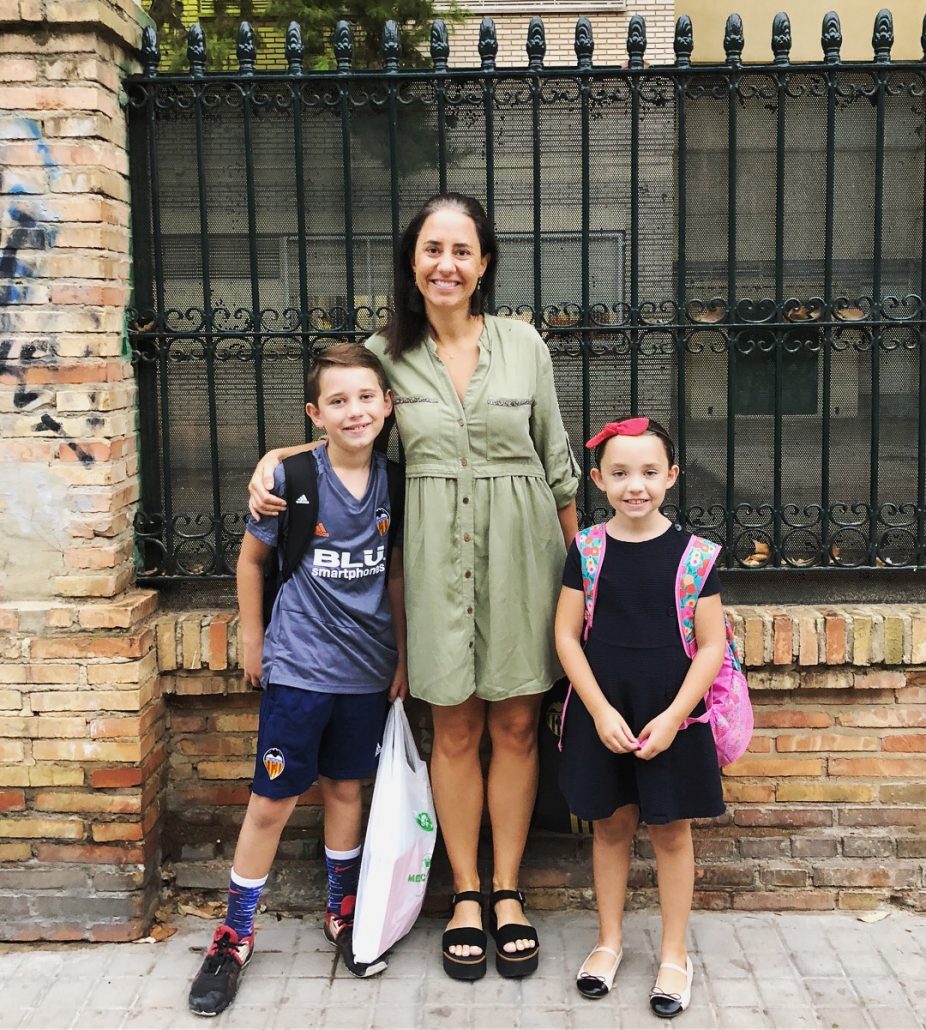 The day I dropped my kids off for their first day of public school in Spain, I cried so hard I could barely function. I cried in the school hallway once my daughter was out of earshot. Her teacher, a complete stranger, had to console me.
The day I dropped my kids off for their first day of public school in Spain, I cried so hard I could barely function. I cried in the school hallway once my daughter was out of earshot. Her teacher, a complete stranger, had to console me.
I speak pretty good “functional Spanish” and I couldn’t even understand this woman- how was my 7-year-old who speaks NO Spanish going to do this DAY, much less the entire school year?
I just kept chanting through sobs “I know this is good for them but I hate this so so much”. 9am to 2pm on Sept. 8 was the longest 5 hours of my recent life and THE day that I had been dreading the most throughout our international move. It was the only uncertain part of this whole experience. Visas are paperwork, a house is just bricks and siding, but my children are another story. What if they didn’t like school? What were we going to do? Homeschool? nope. It’s illegal in Spain. Private school? So expensive and taught in English. There was no plan B.
Both of their teachers do not speak ONE WORD of English. Nada. Neither of my kids knew any Spanish beyond the number 15. They had no friends. There was no before school orientation. Max had to SKIP 3rd grade because they go by birth year here. The kids hadn’t even seen inside the school buildings and did I mention – they had to go to separate schools? How in the BLEEP was this going to work out?!
I stared at my phone all day through tears. I just knew that the teachers were going to call and tell me to come get my kids. That they were panicked and bawling and they needed their mom. That people were staring at them or yelling at them to do something that they didn’t understand.
At approximately 11am, I completely went off the deep end. For some reason this thought hadn’t occurred to me until that moment: “What if they have to go to the bathroom? They can’t even ask that?!!!!” OMG they’re going to pee their pants and Billy Madison won’t be there to say “You’re not cool unless you pee your pants”. My tear ducts were the only thing not pathetic about me. 3 more hours of crying and phone staring.
We had ruined their life, I was sure of it.
Finally, 2pm. Nothing felt better than seeing their little faces come out that school door. They were alive. I couldn’t even believe it. “How was your day peanut?” “OK mama”.
The first 12 days of school were a bit rough but not nearly as bad as I expected.
I creeped on them at school and found Max playing soccer and Sam skipping rope with friends. I went from walking Max into the school to leaving him at the gate. They were exempt from a few tests early on because of the language barrier and an aide was helping in their classroom a few hours a week with language acquisition. “Bit by bit” their patient and loving teachers would tell me…”Poco a poco”.
This has become my 2nd favorite phrase in Spain: “Poco a poco”. Not only does it roll off the tongue, it’s now become a mantra. Little by little we have learned, fallen, overcome, forged relationships through gestures and facial expressions, studied, cried, and laughed. Mainly, we’ve leaned on the kindness and generosity of each other and some amazing new friends that have come to feel like our family.
It really hit me this week – 4 months into school, that the daily reports have graduated from “OK mama” to “¡Súper bien!”
This week I said, “Let’s go around the table and take turns telling our favorite thing about Spanish school”. It was the longest meal at our table since August. Here’s a highlight reel, as there were way too many rounds:
– Metal utensils in the cafeteria and ceramic trays (no waste!)
– Songs on the PA instead of school bells
– Small schools (only one class per grade!)
– “Tutoria” a class when they problem solve social situations (playground drama, choosing nice words, owning mistakes, etc)
– “REAL food, not peaches from a big can. They make everything.” Max, my 9-year-old going on 67.
– Teachers that hug and kiss them all the time
– Being friends with different types of people (diverse religions and nationalities)
– No hard feelings or over sensitivity (The Spanish are refreshingly thick skinned and blunt)
– Walking to school
– Languages (English, Spanish, and Valenciano)
– Having little ones at school with them (school is free in Spain starting from age 3 so there are loads of little uniformed peanuts)
– People wear their clothes two days in a row..haa, less laundry:)
– “No playground equipment so we get to use our imagination!” Sam
So there you have it, their pint-sized POV and the most valuable currency in my world. As we kept going round and round the Taco Tuesday table with all the positives, it became clear…we indeed did not ruin them.
Their Spanish improves every single day. At his haircut yesterday Max cut me off, “don’t translate Mom. I know what she’s saying”. With pleasure buddy;) When we do homework, they’ve already defaulted to using words like “suma, resta, por” and all of the Spanish numbers, as it comes to them quicker than English most days. Eeenie meenie miney mo between siblings has been replaced with the Spanish equivalent. I could go on and on. It’s just incredible.
Bit by bit we’ve shown them that change can be fun, people at their core are kind, and the first step through the school doors is always the hardest. Correction: We did not show them – more like the other way around;)
I hope you do the seemingly scary. It’s never as bad as you think and always worth the trouble. It might not be a new school in a foreign country but maybe my kids at 7 and 9 can inspire you like they do me. Start a blog, write a book, quit your job, buy the shoes, pop the question, retile the bathroom, grind towards your goals and go get your life! You’ll get there “poco a poco” I promise.
And if you can’t beat your fear – do it anyway.
Much love from Valencia,
La familia Hickey

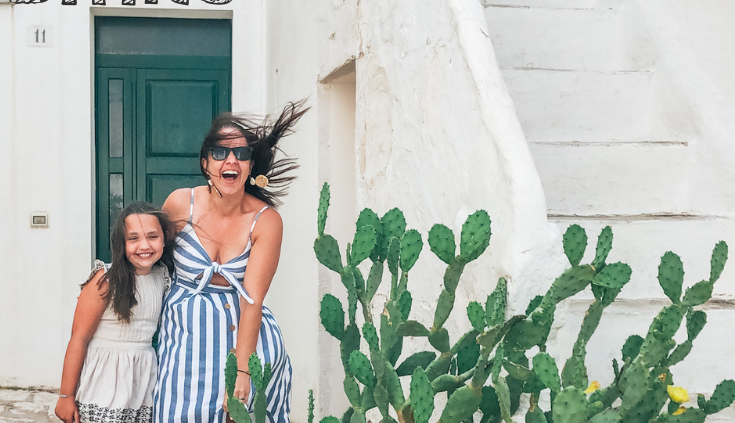

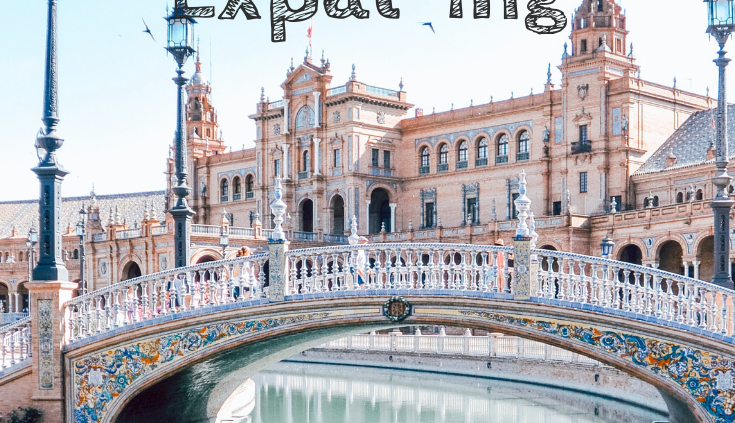
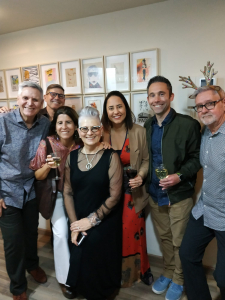
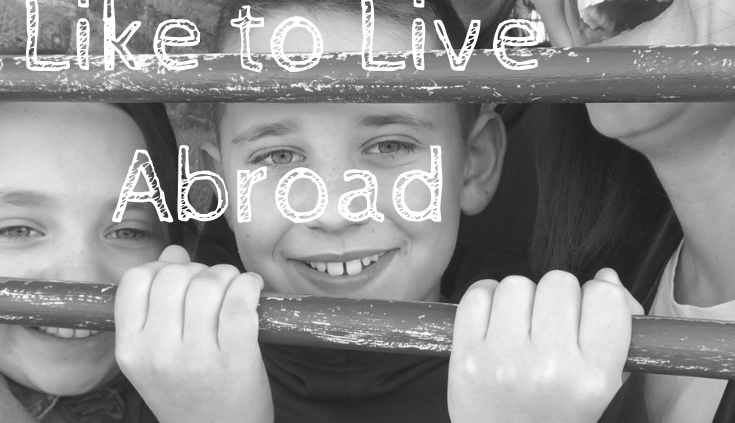
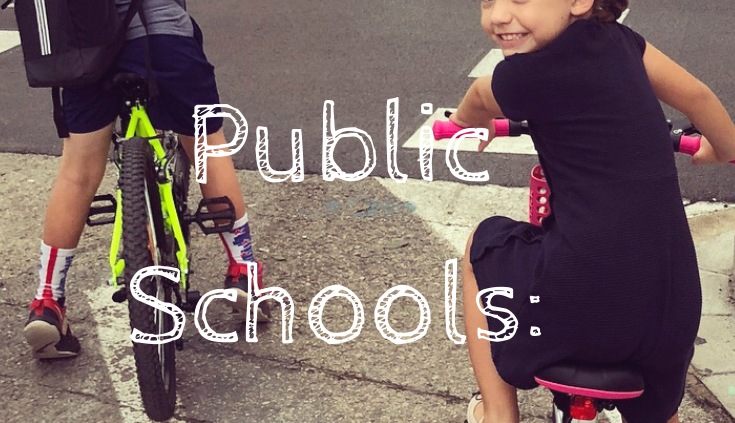
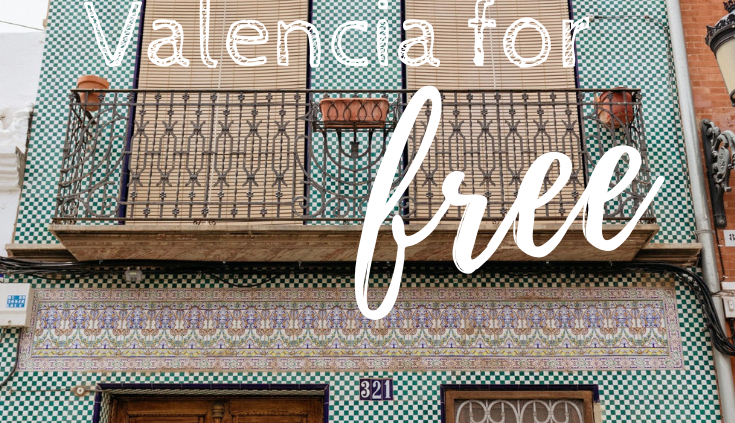 Jaser Cervantes
Jaser Cervantes 